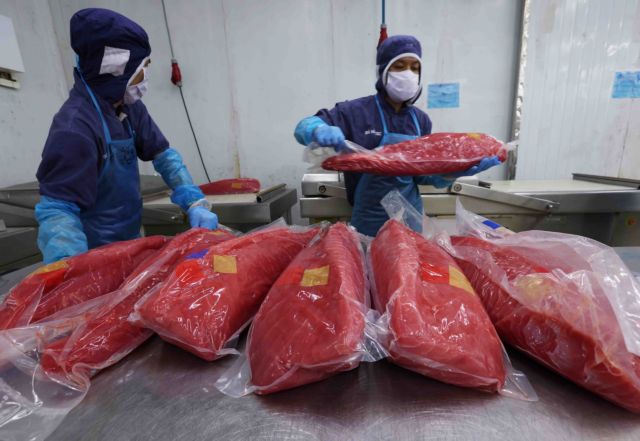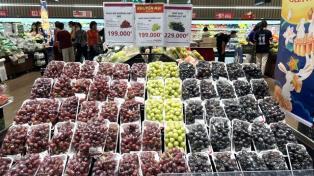According to the Việt Nam Association of Seafood Exporters and Produces, the US’ decisions on declining to acknowledge Việt Nam’s equivalence to 12 seafood harvesting methods affect key export products such as tuna, mackerel, lobster, crab, squid, grouper, swordfish, snapper, mullet and billfish.

HÀ NỘI — Minister of Industry and Trade Nguyễn Hồng Diên has sent a letter to US Commerce Secretary Howard Lutnick urging the US Department of Commerce (DOC) and the National Oceanic and Atmospheric Administration (NOAA) to reconsider their recent decisions declining to acknowledge Việt Nam’s equivalence in 12 seafood harvesting methods under the Marine Mammal Protection Act (MMPA).
The decisions mean imports from the affected fisheries will be banned from January 1, 2026, which could cause disruptions to bilateral trade and threaten the livelihoods of Vietnamese fishermen and workers.
In the letter sent on Monday, Diên also called on Lutnick to ensure a fair and objective outcome for Vietnamese shrimp exporters in the ongoing 19th administrative review of anti-dumping duties, stressing that Vietnamese companies are reliable partners doing business fairly in the US market.
The US decisions would not only affect Vietnamese producers, exporters and fishermen but also US importers, workers and consumers, Diên emphasised.
Việt Nam and the US maintain a comprehensive strategic partnership built on trust and mutual benefit, he said, stressing that Việt Nam considers the US an important trade partner and has created favourable conditions for US investors. Việt Nam remains committed to working closely with the US to resolve outstanding issues constructively towards the future.
According to the Việt Nam Association of Seafood Exporters and Producers (VASEP), the US decisions declined to acknowledge Việt Nam’s equivalence in 12 seafood harvesting methods, including gillnetting, purse seining, trawling, and handlining, deemed to pose high risks to dolphins, whales and other mammals.
The decisions affect key export seafood products of Việt Nam such as tuna, mackerel, lobster, crab, squid, grouper, swordfish, snapper, mullet and billfish.
The disruptions would cause a loss of half a billion dollars in annual seafood exports, the association estimated. Fisheries affected by the US decisions currently generate an estimated export value of around $511 million, accounting for 24 per cent of Việt Nam’s seafood exports to the US, of which tuna alone makes up $387 million.
Tuna exports have slowed down in the first seven months of this year, totalling $532 million, 3 per cent lower than the same period last year. Tuna exports in July dropped by 20 per cent.
VASEP noted that Việt Nam has made strong efforts to modernise fisheries management, including the adoption of the Law on Fisheries 2017 and compliance with rules on illegal, unreported and unregulated (IUU) fishing, dolphin-safe certification for tuna exports and many other marine mammal protection programmes.
VASEP has urged the government and ministries to take urgent short- and long-term measures to support seafood exporters and prevent major disruptions to seafood exports to the US.
“If we failed to provide timely solutions for reconsideration, the seafood industry will be heavily affected,” SAID VASEP’s General Secretary Nguyễn Hoài Nam.
Long-term measures
According to Tô Việt Châu, Deputy Director of International Cooperation under the Ministry of Agriculture and Environment, the US has assessed Việt Nam’s equivalence with the MMPA at a partial level, while 89 countries and territories have been fully recognised, underscoring the urgent need to improve the monitoring system and technical standards to enhance equivalence.
Deputy Director of the Directorate of Fisheries and Fishery Surveillance Lê Trần Nguyên Hùng said the MMPA requires all countries exporting seafood to the US to adopt marine mammal protection measures equivalent to those of the US in order to minimise incidental catches.
Việt Nam is among 34 countries recognised as partially equivalent, with 11 fisheries deemed equivalent and 12 non-equivalent.
Việt Nam will learn from countries that have been fully recognised in order to strengthen its capacity to meet US requirements, Hùng said, adding that a detailed roadmap is being developed towards full equivalence recognition.
Deputy Minister of Agriculture and Environment Phùng Đức Tiến said the ministry is developing a plan with 112 key tasks aimed at achieving full equivalence to maintain Việt Nam’s market share in the US.
The ministry also urged efforts to adapt to US tariff policies and comply with increasingly stringent food safety requirements from the US as well as the EU and Japan.
The latest update from the General Department of Customs showed that seafood exports reached $1.07 billion in August, bringing the total seafood export value to $7.15 billion in the first eight months of this year, up 13.5 per cent over the same period last year.
China is the largest market with a share of nearly 20 per cent, followed by the US with 17.28 per cent, Japan with 15.17 per cent and the Republic of Korea with 7.45 per cent. — VNS





